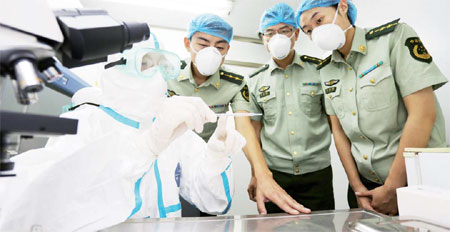China gears up its efforts in fight against Ebola
|
An expert at the Inspection and Quarantine Department at the airport in Qingdao, Shandong province, explains signs and symptoms of Ebola carriers to the border inspection police on Aug 11. Xie Hao / for China Daily |
Medical experts and equipment sent to West Africa and facilities prepared at home, as epidemic's death toll tops 1,000
China is gearing up to fight the deadly outbreak of the Ebola virus in West Africa, sending medical teams to the area, and introducing measures to handle any possible cases that might arrive on its own shores.
Three teams of Chinese experts left on Aug 10 for the countries hardest hit by the latest outbreak, which started in February in Guinea and has since ravaged areas of Liberia and Sierra Leone before being detected in Nigeria, leaving more than 1,000 dead in its wake.
The teams will primarily help distribute supplies to authorities locally, but also guide Chinese communities in the areas on self-protection.
China's Ministry of Commerce said about 20,000 Chinese live in the three main affected countries.
More clinical infectious disease doctors from Beijing and Hunan province are also being prepared to send to the countries to offer assistance.
Each Chinese team sent comprises an epidemiologist and two specialists in disinfection and protection.
On Aug 14, China also pledged further humanitarian aid supplies worth 30 million yuan ($4.87 million) for Ebola-hit countries to help contain the outbreak.
"China has joined the global community to boost the fight against Ebola," said Custodia Mandlhate, the World Health Organization representative for Kenya, adding that China's past experience with infection response would help the affected countries combat the outbreak.
Li Qun, emergency response chief at the Chinese Center for Disease Control and Prevention, said: "Our experts' communication with local frontline medics for Ebola control and treatment will help with our own response to the virus at both clinical and research sites," adding that China has never had an Ebola outbreak, or used the virus strain for research purposes.
Dong Xiaoping, deputy director of the emergency response division of the CDC, confirmed that there are no direct Chinese flights to the affected countries, saying that while the possibility for Ebola entering China "remains remote, it does exists".
He said: "A mass outbreak in China can be ruled out, given response capacity here.
"In case of isolated cases, we are capable of 'contact tracing' to cut further spread," he said, and that clinical sides were ready to treat patients and hospital infection control as well.
China's top health authority, the National Health and Family Planning Commission, already issued an Ebola fever response plan on July 31.
Local medical institutions must report any confirmed or suspected Ebola cases directly to the commission within two hours, via a Web-based reporting system.
Other key information including clinical symptoms, virus screening, contact tracing, and even disposal of dead bodies were detailed.
"In fact the Ebola response guidelines were distributed among all stakeholders including the health, transportation, and customs check in bio-safety preparation of the 2008 Beijing Olympics," said Song Shuli, the commission's spokeswoman.
He Xiong, deputy director of Beijing's CDC said: "Sound health emergency preparedness enabled by multi-department collaboration has been in place in China as a legacy of the nation's SARS response in 2003."
Chinese hospitals also have the ability to alert public health departments of suspicious cases or report each confirmed cases, and in return, public health departments can help update overall outbreak development and devise or adjust response strategy.
Xu Qian, head of the infectious disease department of China-Japan Friendship Hospital, which treated SARS patients during that epidemic, which killed 349 people on the Chinese mainland alone, said: "The infection control awareness has largely been enhanced since SARS and the frontline high alert at our department toward any infections including Ebola has become routine," she explained.
Starting even before the plan issued by the commission, "we had taken action like staff training and checking patients with fever for background information like if they'd traveled to the affect areas," she added.
China's quarantine authority has also ordered strengthened inspections at customs to bar the virus from outside.
In late July, a Hong Kong woman who showed symptoms similar to those of the Ebola virus after visiting Kenya tested negative for the disease, but still caused brief panic.
The General Administration of Quality Supervision, Inspection and Quarantine said on Aug 4 in a work notice that it would implement stricter inspections on inbound airlines from regions affected by Ebola, and step up sanitary measures on incoming vehicles and goods.
Meanwhile, the WHO said that two experimental vaccines against Ebola have been set to start clinical trials in the coming weeks and there could be enough early-stage data to plan their emergency use later this year.
shanjuan@chinadaily.com.cn



















